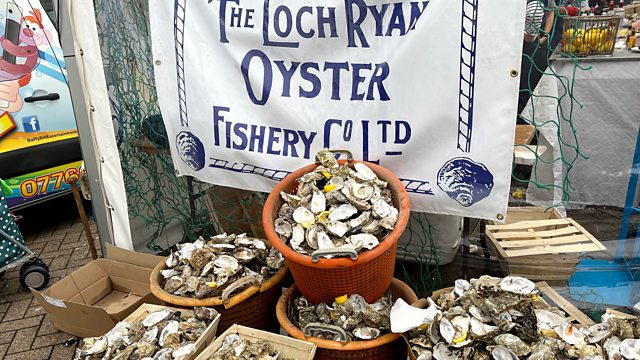Loch Ryan's Wild Native Oysters
From a Scottish sea loch to posh London restaurants. Kathleen Carragher reports on the survival of the endangered wild native oyster, once plentiful around Britain's shores.
For the past five years the town of Stranraer has hosted a festival celebrating Loch Ryan's native oyster beds. Thousands of visitors enjoy the taste of a wild native oyster and watch the oyster "shucking" competition. For the Loch Ryan Oyster Fishery company, it's a major showcase to sell their produce, explain their farming methods and highlight the importance of native oysters.
While many other native oyster beds declined through centuries of overfishing, the Loch Ryan fishery has managed to survive. The fishing rights are owned by the Wallace family who were granted them by royal charter, by King William III, in 1701. Thirty years ago the Wallace family asked Tristan Hugh-Jones, an oyster farmer from Cork, to manage the fishery. He and his team have succeeded in growing numbers from an estimated one million to sixty million. "It's all about sustainable fishing" says Tristan. "We return 95% of our catch to the sea bed, into areas where the oysters are tightly packed and this enhances the chances of fertilisation."
Bags of oysters are shipped off to London where they're cleaned in filtration tanks and sold as a luxury product in some of the city's top restaurants. Wild native oysters are distinct from the more commonly available ‘farmed’ rock oysters. They grow more slowly and have a flatter, thicker shell. Tristan Hugh-Jones is not enthusiastic about exporting them: he says the complexity of Brexit regulations on transporting live produce makes it a time-consuming and risky option.
When the Stranraer Oyster Festival was first held five years ago, few people in the town were aware of the existence of Loch Ryan native oysters. This year more than ten thousand oysters were consumed over the three day event.
Produced and presented by Kathleen Carragher
Last on
More episodes
Previous
Next
Broadcast
- Sun 12 Nov 2023 06:35�鶹������ҳ��� Radio 4

